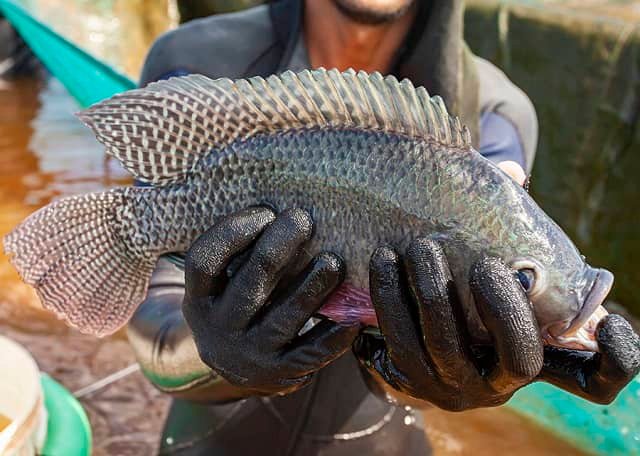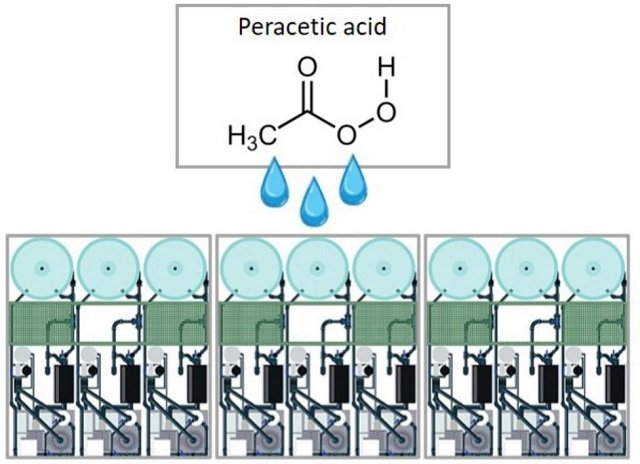
Antibiotics play a vital role in aquaculture, effectively combating bacterial infections that threaten the health and well-being of our aquatic food sources. However, these medications can have unintended consequences and potentially harm the very fish they are meant to protect.
A recent study sheds light on these concerns and reveals an interesting alternative: Vitamin C (ascorbic acid, AA).
Scientists from the Animal Health Research Institute (AHRI) Agriculture Research Center (ARC) explored the impact of oxytetracycline (OTC), a commonly used antibiotic in aquaculture, on Nile tilapia (Oreochromis niloticus). They compared two doses, therapeutic (80 mg/kg) and high (160 mg/kg), along with fish fed with and without AA in the diet. As an added benefit, they conducted a bacterial stress test to see how the fish fared after exposure to antibiotics.
The researchers studied how different doses of OTC affected fish health, focusing on DNA damage, tissue changes, and protein levels. They also explored the potential of AA to mitigate these negative effects and even enhance fish resistance to diseases.
Oxytetracycline
Oxytetracycline (OTC) is one of the antibiotics authorized for use in aquaculture and is used to combat bacterial diseases in fish caused by species such as Vibrio anguillarum, Aeromonas hydrophila, Aeromonas salmonicida, and Pseudomonas.
The oral route is one of the most popular methods for administering antibiotics in aquaculture because it reduces the impact of ecological contamination.
However, it’s important to note that the excessive and inappropriate use of antibiotics in aquaculture contributes to the spread of antibiotic resistance and generates residues that remain in water, fish tissues, or sediments.
Effect of High Doses of Antibiotics
The findings are both concerning and promising!
According to the study results, high doses of OTC wreaked havoc, reducing immune activity, damaging organs, and even causing damage to the DNA of liver cells in fish. This resulted in higher rates of morbidity and mortality after the bacterial challenge.
Stay Always Informed
Join our communities to instantly receive the most important news, reports, and analysis from the aquaculture industry.
This highlights the importance of using antibiotics responsibly and exploring alternative strategies for disease control.
The Importance of Vitamin C
Fish fed with AA showed a notably different story. Their antioxidant enzymes soared, boosting their natural defenses against cellular damage. They also exhibited improved immune function and significantly lower morbidity and mortality.
Additionally, Vitamin C alleviates stress in tilapia, helping them cope with the additional burden of antibiotic treatment.
Vitamin C and Oxytetracycline
More importantly, combining AA with OTC proved to be a winning strategy. Both OTC doses with AA supplements led to significantly better health parameters and resistance against bacterial stress compared to simple OTC groups. This suggests that AA can act as a potent shield against the harmful effects of high antibiotic doses.
Importance for Aquaculture
The findings of this study offer a ray of hope for sustainable aquaculture. The use of a safe and readily available supplement like AA along with antibiotics could minimize unwanted side effects, improve fish health, and ultimately reduce losses in aquaculture farms.
Key Conclusions
“These results corroborate the use of AA as a potent antioxidant and immunostimulant and a potential adjuvant of OTC in the diet of O. niloticus to achieve optimal disease resistance,” concluded the scientists.
The main takeaways from the study can be summarized as follows:
- The use of high doses of antibiotics in aquaculture can have negative consequences for health.
- Vitamin C acts as a potent antioxidant and immune system booster in fish.
- Combining Vitamin C with antibiotics can mitigate harmful side effects and improve fish health.
Remember, this is just a brief overview. The full scientific study delves into the fascinating details of fish physiology, antibiotic action, and the protective power of Vitamin C. So, if you’re curious to dive deeper, feel free to explore the original research and discover more.
The study has been funded by Science, Technology & Innovation Funding Authority (STDF) in cooperation with The Egyptian Knowledge Bank (EKB).
Contact
Nagwa I. S. Abu-Zahra
Department of Fish Diseases, Kafrelsheikh Provincial Lab
Animal Health Research Institute (AHRI) Agriculture Research Center (ARC)
Giza, Egypt
Email: nagwaabuzahra09@gmail.com
Reference (open access)
Abu-Zahra, N.I.S., Atia, A.A., Elseify, M.M. et al. Biological and histological changes and DNA damage in Oreochromis niloticus exposed to oxytetracycline: a potential amelioratory role of ascorbic acid. Aquacult Int (2023). https://doi.org/10.1007/s10499-023-01356-5
Editor at the digital magazine AquaHoy. He holds a degree in Aquaculture Biology from the National University of Santa (UNS) and a Master’s degree in Science and Innovation Management from the Polytechnic University of Valencia, with postgraduate diplomas in Business Innovation and Innovation Management. He possesses extensive experience in the aquaculture and fisheries sector, having led the Fisheries Innovation Unit of the National Program for Innovation in Fisheries and Aquaculture (PNIPA). He has served as a senior consultant in technology watch, an innovation project formulator and advisor, and a lecturer at UNS. He is a member of the Peruvian College of Biologists and was recognized by the World Aquaculture Society (WAS) in 2016 for his contribution to aquaculture.







